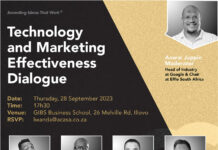This is what we know. We are living in a hyper-connected, digital world where machines are talking to other machines. But, it is after all still a human planet. So here’s the important bit: the driving force to integrate the machine world into the human word is artificial intelligence; in short AI.
AI is however only that which is presented on the surface. It’s what lies beneath – the machine programmes that are the drivers of a successful AI solution, and the intelligence gleaned from these that benefit marketing.
A recent Martech survey shows that almost 80 percent of marketers say AI will be the next big thing, but an astonishing 90 percent of professionals aren’t yet using AI in their marketing. The survey also shows that only 40 percent of that 90 percent plan on using it in the next three years.
This is possibly due to AI being seen as still an alien concept, especially when a user is presented with a bottomless sea of data. It can be overwhelming. However, AI – and more specifically machine learning – is the autonomous solution that makes sense of all the data so that it can positively be used in the world of marketing.
Back to basics
In simple terms, salesforce.com explains AI as “the concept of having machines ‘think like humans’ – in other words, perform tasks like reasoning, planning, learning, and understanding language. While no one is expecting parity with human intelligence today or in the near future, AI has big implications in how we live our lives. The brain behind artificial intelligence is a technology called machine learning, which is designed to make our jobs easier and more productive.
Okay cool, but what exactly is machine learning? Again looking to salesforce.com’s basic definitions, machine learning is the “core driver of AI. It is the concept of having computers learn from data with minimal processing.”
That is, data is fed to the computer, whether you are swiping a loyalty card at a supermarket or surfing the web. The computer detects patterns and provides “marketer’s gold” – that is, superb insight into the customer.
If you are a customer of two of our foremost retail stores, you have probably noticed the personalised vouchers sent based on your most purchased items; this is a machine learning garnered from human habits.
The good news is that AI solutions combining machine learning have become both straightforward and cost-effective, meaning they can easily integrated into all businesses. You don’t need to be a data scientist or a computer boffin to deploy a good machine learning solution.
What will make the good marketers stand out from the rest though is how specific you are regarding what information you would like to assemble per customer. By doing this you add both a hypothetical or real voice – think Siri, or other virtual assistants – for your marketing to add real value to your customers’ lives, your projection abilities and so optimise the entire business. It’s all about predictive journeys and personalisation, in a way that has never before been possible. Think of it as your crystal ball.
Jeffry Nimeroff, CIO at Zeta Global, really summed it up it in a great way when he published an article on Forbes.com. He said: “Machine learning techniques are being used to solve many diverse problems, and we stand to benefit as we move towards a world of hyper-converged data, channels, content, and context – having the right conversation at the right time with the right person in the right way. For us marketers, machine learning is about finding nuggets of ‘predictive’ knowledge in the waves of structured and unstructured data.”
Nimeroff also identified the following four marketing areas that will be impacted by machine learning this year:
- Automated data visualisation (including machine learning results) will become more rich, and user-friendly.
- Content analysis (textual, lexical, multimedia/ rich) will be used to drive better marketing conversations.
- Incremental machine learning techniques will become more prevalent, leading to real-time, not just on-going and automated, changes in marketing execution.
- Learning from machine learning results will accelerate the growth and skills of marketing professionals.
Machine learning is pushing the marketing industry forward – full stop. It may seem otherworldly for now – as with anything new, and it will take some time to be fully understood. But, it is a conversation that needs to take place in every marketing department.
We are all beginners and so need to arm ourselves with as much knowledge as possible whether through online courses, conversing with gurus, or reading as much as possible about this phenomenal phenomenon.
AI is an evolutionary steps that will have serious implications on your marketing. Drill down further into these concepts and other burning marketing issues at Madex 2018, taking place between 6 and 7 June 2018 at the Sandton Convention Centre in Johannesburg. For more information, visit www.madex.co.za
For more info please contact:
Specialised Exhibitions Montgomery, Natasha Heiberg, tel: +27 (011) 835-1565 info@madex.co.za, www.madex.co.za
icomm, Nicola Read, +27 (0)83 269 2227, nicola@pr.co.za, www.icomm-pr.co.za






















































































